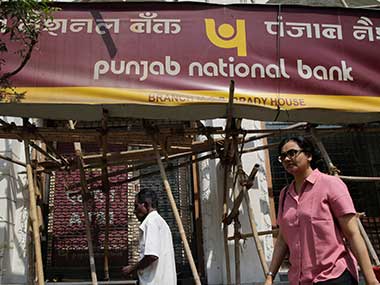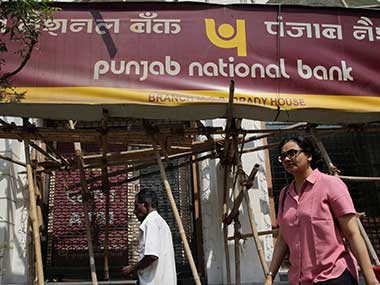In the two trading sessions after the big bank merger announcement, the public sector banks (PSBs) have lost a combined market cap of close to Rs 11,000 crore. Investors have given a thumbs down to the mega-merger exercise. For better understanding, let’s look at the share movement of the acquiring banks or the anchor banks involved in the merger process. Punjab National Bank (PNB) which is to merge Oriental Bank of Commerce and United Bank of India with itself has lost 7.78 percent in share value. Canara Bank which has been asked to merge Syndicate Bank with itself lost close to 13 percent in share value in two sessions, Union Bank has lost nearly 9 percent while Indian Bank is down by nearly 17 percent. Mentioning the lead banks because these are the ones whose business plans and liabilities will be affected the most on account of this exercise, more than the merging banks. That’s the reason why the fall on the share prices of the merging banks aren’t beaten down as much as that of the anchor banks. [caption id=“attachment_4409049” align=“alignleft” width=“380”] Punjab National Bank. Reuters.[/caption] What is worrying the shareholders? One immediate issue could be the lack of clarity on the swap ratio of this exercise. If the swap ratio isn’t in shareholders’ favour, the shareholders will further dump the stocks of these banks. Another worry could be the uncertainty on the future business of acquiring entities. Finance Minister Nirmala Sitharaman has committed about no job losses post-mega merger which means banks have to deal with duplication of roles in many departments during the integration process. The merged entity will have to thus deal with the HR cost and integration problems. Further, the credit operations are unlikely to take off in a big way as the capital presently allocated may not suffice. Most importantly, this merger exercise itself will have practically no effect on the bad loan reduction. Most of these banks have high non-performing assets (NPAs). As this report in The Hindu rightly points out, of the
10 banks being merged
, nine have net NPAs of over 5 percent. This is with the exception of Indian Bank which has a net NPA below at 3.75 percent as on 31 March 2019. Among others, United of Bank of India has a net NPA of 8.67 percent as on 31 March, PNB (6.55 percent), Oriental Bank of Commerce (5.93 percent), Canara Bank (5.37 percent), Syndicate Bank (6.16 percent) and Union Bank (6.85 percent). Andhra Bank has a net NPA of 5.73 percent and Corporation Bank has 5.7 percent. Merging these banks won’t make the NPAs disappear but it will be like bundling small problems into one big problem to deal with. Capital required to service these assets will be commensurately high.
Punjab National Bank. Reuters.[/caption] What is worrying the shareholders? One immediate issue could be the lack of clarity on the swap ratio of this exercise. If the swap ratio isn’t in shareholders’ favour, the shareholders will further dump the stocks of these banks. Another worry could be the uncertainty on the future business of acquiring entities. Finance Minister Nirmala Sitharaman has committed about no job losses post-mega merger which means banks have to deal with duplication of roles in many departments during the integration process. The merged entity will have to thus deal with the HR cost and integration problems. Further, the credit operations are unlikely to take off in a big way as the capital presently allocated may not suffice. Most importantly, this merger exercise itself will have practically no effect on the bad loan reduction. Most of these banks have high non-performing assets (NPAs). As this report in The Hindu rightly points out, of the
10 banks being merged
, nine have net NPAs of over 5 percent. This is with the exception of Indian Bank which has a net NPA below at 3.75 percent as on 31 March 2019. Among others, United of Bank of India has a net NPA of 8.67 percent as on 31 March, PNB (6.55 percent), Oriental Bank of Commerce (5.93 percent), Canara Bank (5.37 percent), Syndicate Bank (6.16 percent) and Union Bank (6.85 percent). Andhra Bank has a net NPA of 5.73 percent and Corporation Bank has 5.7 percent. Merging these banks won’t make the NPAs disappear but it will be like bundling small problems into one big problem to deal with. Capital required to service these assets will be commensurately high.
| Public sector banks | Price on 30 August | Price on 4 Sep | % change | Mcap as on 30 August | Mcap as on 4 Sep | Change |
|---|---|---|---|---|---|---|
| Rs | Rs | Rs crore | Rs crore | Rs crore | ||
| Punjab National Bank | 64.95 | 59.90 | -7.78 | 29903 | 27578 | -2325 |
| Canara Bank | 220.55 | 192.95 | -12.51 | 16613 | 14534 | -2079 |
| Indian Bank | 200.20 | 166.80 | -16.68 | 9832 | 8192 | -1640 |
| Oriental Bank | 73.50 | 66.65 | -9.32 | 10071 | 9132 | -939 |
| Union Bank | 58.90 | 53.70 | -8.83 | 10384 | 9467 | -917 |
| Corporation Bank | 18.85 | 17.55 | -6.90 | 11299 | 10520 | -779 |
| Allahabad Bank | 35.30 | 33.30 | -5.67 | 13138 | 12393 | -744 |
| Bank of India | 65.55 | 63.45 | -3.20 | 21480 | 20792 | -688 |
| UCO Bank | 15.85 | 15.05 | -5.05 | 11669 | 11080 | -589 |
| Indian Overseas Bank | 10.40 | 9.96 | -4.23 | 9507 | 9105 | -402 |
| Central Bank | 19.75 | 18.90 | -4.30 | 8149 | 7798 | -351 |
| Bank of Maha | 12.53 | 12.00 | -4.23 | 7298 | 6989 | -309 |
| United Bank | 10.42 | 10.15 | -2.59 | 7740 | 7539 | -201 |
| Andhra Bank | 19.75 | 19.40 | -1.77 | 5894 | 5790 | -104 |
| Syndicate Bank | 32.35 | 32.10 | -0.77 | 8682 | 8615 | -67 |
| Punjab & Sind Bank | 21.25 | 20.60 | -3.06 | 1279 | 1240 | -39 |
| Bank of Baroda | 92.60 | 93.30 | 0.76 | 35621 | 35890 | 269 |
| State Bank of India | 273.70 | 274.95 | 0.46 | 244267 | 245382 | 1116 |
| Total | -10788 |
According to India Ratings and Research, in the near term, the priorities of the management of these 10 banks could shift towards ensuring the successful integration of the entities, resulting in a reduced focus on business growth as well as improvement in asset quality. Since FY14, the government of India (GoI) and Life Insurance Corporation (LIC) have infused Rs 3 lakh crore in the PSBs, even as their systemic importance continued to decline. As the agency points out, one big problem with the current round of bank merger when seen against the three-way merger of Bank of Baroda (BoB) with Dena and Vijaya Bank is that there are many weaker banks in the current lot. In the case of BoB merger, two strong banks were taking in a weak small bank. But in the current round, multiple weak banks are being merged. Some of them have equal size and most of these entities share NPA problems. It is very unlikely that credit growth will be revived in the near future because of two key reasons. One, demand in the economy is very mute in the backdrop of severe slowdown and erosion of consumer confidence. Many auto dealers have shut doors and companies, including Maruti Suzuki, are slashing production. Why would companies, struggling to push even existing inventories, borrow more at this stage? Second, bank capitalisation exercise announced so far wouldn’t be enough for banks to meet credit growth even if demand picks up. Banks need to also set aside money to cover their bad assets and meet reserve requirements. Finally, the implementation of the merger exercise is key. As this writer cited earlier, in some of these anchor banks, the term of bank chiefs is getting over by end-2019 or early 2020. A new appointee as bank chief will be walking into a tough spot as the individual will have a herculean task of merging three banks. A lot will depend on the implementation. If the merger exercise is successful and asset quality, capital issues are sorted out, there will be gains in the long term. Till then, the shares of PSBs may continue to remain under pressure. (Kishor Kadam provided data for this story)
)